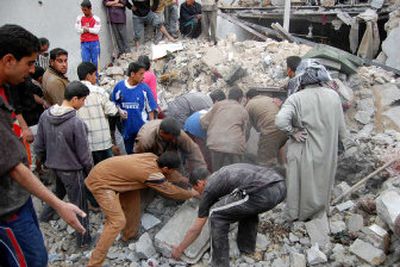Military cites new insurgent tactics

WASHINGTON – Insurgents in Iraq are employing an array of new tactics – from an unprecedented string of helicopter shoot-downs to unusual chlorine bomb attacks and direct assaults on U.S. military bases – that American commanders say are intended to create “chaos” and undermine the U.S. and Iraqi military push to quell violence in Baghdad.
Lt. Gen. Ray Odierno, the second-ranking U.S. commander of the multinational coalition in Iraq, said Thursday that he believed a U.S. Army Black Hawk helicopter that went down Wednesday north of Baghdad had been shot down – which would make it the eighth U.S. military or civilian aircraft to be downed by insurgents since Jan. 20.
Odierno said that he believed “al-Qaida-associated cells” using similar tactics are behind at least some of the downings, and that U.S. raids in recent days have led to the capture of two individuals suspected to be cell members, one of whom admitted he was involved in shooting down an aircraft.
Chlorine-laced bombs are another new tactic, and Thursday in Baghdad four more people died from ingesting the chlorine fumes that emanated from a blast the day before on the road to the capital’s airport, raising the death toll in the attack to seven people, said Col. Sami Hassan, of the Interior Ministry.
“This is just the first time that we’ve seen the chlorine used in this way,” said Lt. Col. Christopher Garver, a U.S. military spokesman in Baghdad. He said he knew of no more than two or three people who died from ingesting the chlorine – a common industrial chemical used heavily in water treatment in Baghdad, and not a “weaponized-chemical” agent capable of inflicting massive casualties.
Insurgents are attempting to “adapt in such ways where they can continue to create instability. And that’s what they’re doing, especially with these chlorine (vehicle-borne bombs),” said Odierno, adding that U.S. and Iraqi forces stationed around Baghdad were taking steps to prevent car bombs from entering crowded areas. He said U.S. troops on Tuesday discovered a car-bomb factory outside Fallujah that contained chlorine cylinders.
More aggressive, direct attacks by insurgents on bases housing the U.S. military are another troubling new development.
Last month, four U.S. soldiers were killed after being kidnapped at their compound in Karbala, and this week a suicide bomb attack on a U.S. military facility in Tarmiyah north of Baghdad left three soldiers dead. Also Thursday, U.S. soldiers killed at least 12 suspected insurgents and wounded three others in a six-hour battle starting at 7:30 p.m. in eastern Ramadi, the capital of Anbar province in western Iraq.